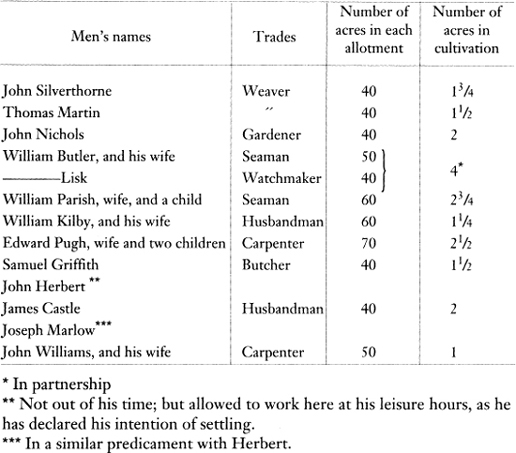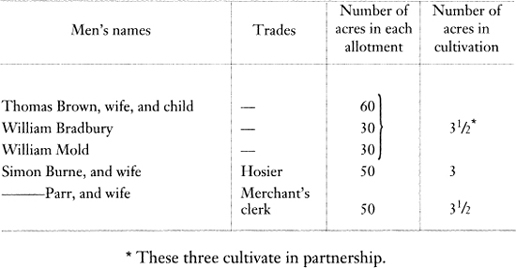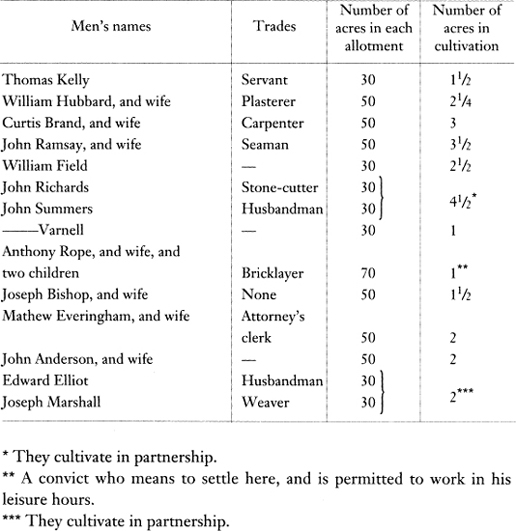Watkin Tench's 1788 (30 page)

December 3rd, 1791
. Began my survey of the cultivated land belonging to the public. The harvest has commenced. They are reaping both wheat and barley. The field between the barrack and the governor's house contains wheat and maize, both very bad, but the former particularly so. In passing through the main street I was pleased to observe the gardens of the convicts look better than I had expected to find them. The vegetables in general are but mean, but the stalks of maize, with which they are interspersed, appear green and flourishing. The semicircular hill which sweeps from the overseer of the cattle's house to the governor's house, is planted with maize, which, I am told, is the best here. It certainly looks in most parts very goodâstout thick stalks with large spreading leavesâbut I am surprised to find it so backward. It is at least a month later than that in the gardens at Sydney. Behind the maize is a field of wheat, which looks tolerably for this part of the world. It will, I reckon, yield about twelve bushels an acre. Continued my walk and looked at a little patch of wheat in the governor's garden, which was sown in drills, the ground being first mixed with a clay which its discoverers pretended was marle. Whatever it be, this experiment bespeaks not much in favour of its enriching qualities; for the corn looks miserably, and is far exceeded by some neighbouring spots on which no such advantage has been bestowed. Went round the crescent at the bottom of the garden, which certainly in beauty of form and situation is unrivalled in New South Wales. Here are eight thousand vines planted, all of which in another season are expected to bear grapes. Besides the vines are several small fruit trees, which were brought in the
Gorgon
from the Cape, and look lively; on one of them are half a dozen apples as big as nutmegs. Although the soil of the crescent be poor, its aspect and circular figure, so advantageous for receiving and retaining the rays of the sun, eminently fit it for a vineyard. Passed the rivulet and looked at the corn land on its northern side. On the western side of Clarke's
*
house the wheat and maize are bad, but on the eastern side is a field supposed to be the best in the colony. I thought it of good height, and the ears well filled, but it is far from thick.
While I was looking at it, Clarke came up. I told him I thought he would reap fifteen or sixteen bushels an acre; he seemed to think seventeen or eighteen. I have now inspected all the European corn. A man of so little experience of these matters as myself cannot speak with much confidence. Perhaps the produce may average ten bushels an acre, or twelve at the outside. Allowance should, however, be made in estimating the quality of the soil, for the space occupied by roots of trees, for inadequate culture, and in some measure to want of rain. Less has fallen than was wished, but this spring was by no means so dry as the last. I find that the wheat grown at Rose Hill last year weighed fifty-seven pounds and a half per bushel. My next visit was to the cattle, which consists of two stallions, six mares, and two colts; besides sixteen cows, two cow-calves, and one bull-calf, which were brought out by the
Gorgon
. Two bulls which were on board died on the passage, so that on the young gentleman just mentioned depends the stocking of the colony.
The period of the inhabitants of New South Wales being supplied with animal food of their own raising is too remote for a prudent man to calculate. The cattle look in good condition, and I was surprised to hear that neither corn nor fodder is given to them. The enclosures in which they are confined furnish hardly a blade of grass at present. There are people appointed to tend them who have been used to this way of life, and who seem to execute it very well.
Sunday, December 4th, 1791
. Divine service is now performed here every Sunday, either by the chaplain of the settlement or the chaplain of the regiment. I went to church today. Several hundred convicts were present, the majority of whom I thought looked the most miserable beings in the shape of humanity I ever beheld. They appeared to be worn down with fatigue.
December 5th
. Made excursions this day to view the public settlements. Reached the first, which is about a mile in a north-west direction from the governor's house. This settlement contains, by admeasurement, 134 acres, a part of which is planted with maize, very backward, but in general tolerably good, and beautifully green. Thirteen large huts, built in the form of a tent, are erected for the convicts who work here; but I could not learn the number of these last, being unable to find a superintendent or any person who could give me information. Ponds of water here are sufficient to supply a thousand persons.
Walked on to the second settlement, about two miles farther, through an uncleared country. Here met Daveney, the person who planned and now superintends all the operations carried on here. He told me that he estimated the quantity of cleared ground here at 300 acres. He certainly over-rates it one-third, by the judgment of every other person. Six weeks ago this was a forest. It has been cleared, and the wood nearly burnt off the ground, by 500 men, in the before-mentioned period, or rather in thirty days, for only that number have the convicts worked. He said it was too late to plant maize, and therefore he should sow turnips, which would help to meliorate and prepare it for next year. On examining the soil, I thought it in general light, though in some places loamy to the touch. He means to try the Rose Hill
marle
upon it, with which he thinks it will incorporate well. I hope it will succeed better than the experiment in the governor's garden. I wished to know whether he had chosen this ground simply from the conveniency of its situation to Rose Hill, and its easy form for tillage, and having water, or from any marks which he had thought indicated good soil. He said that what I had mentioned no doubt weighed with him, and that he judged the soil to be good, from the limbs of many of the trees growing on it being
covered with moss
.
âAre,' said I, âyour 500 men still complete?'
âNo; this day's muster gave only 460. The rest are either sick and removed to the hospital, or are run away in the woods.'
âHow much is each labourer's daily task?'
âSeven rods. It was eight, but on their representing to the governor that it was beyond their strength to execute, he took off one.'
Thirteen large huts, similar to those beforementioned, contain all the people here. To every hut are appointed two men as hutkeepers, whose only employment is to watch the huts in working hours to prevent them from being robbed. This has somewhat checked depredations, and those endless complaints of the convicts that they could not work because they had nothing to eat, their allowance being stolen. The working hours at this season (summer) are from five o'clock in the morning until ten; rest from ten to two; return to work at two; and continue till sunset. This surely cannot be called very severe toil; but on the other hand must be remembered the inadequacy of a ration of salt provisions, with few vegetables, and unassisted by any liquor but water.
Here finished my remarks on everything of a public nature at Rose Hill. But having sufficient time, I determined to visit all the private settlers to inspect their labours, and learn from them their schemes, their hopes and expectations.
In pursuance of my resolution, I crossed the country to Prospect Hill, at the bottom of which live the following thirteen convicts, who have accepted allotments of ground, and are become settlers.

The terms on which these allotments have been granted are: that the estates shall be fully ceded forever to all who shall continue to cultivate for five years, or more; that they shall be free of all taxes for the first ten years; but after that period to pay an annual quit-rent of one shilling. The penalty on nonperformance of any of these articles is forfeiture of the estate, and all the labour which may have been bestowed upon it. These people are to receive provisions (the same quantity as the working convicts), clothes, and medicinal assistance, for eighteen months from the day on which they settled.
To clear and cultivate the land, a hatchet, a tomahawk, two hoes, a spade and a shovel are given to each person, whether man or woman; and a certain number of cross-cut saws among the whole. To stock their farms, two sow pigs were promised to each settler, but they almost all say they have not yet received any, of which they complain loudly. They all received grain to sow and plant for the first year. They settled here in July and August last. Most of them were obliged to build their own houses; and wretched hovels three-fourths of them are. Should any of them fall sick, the rest are bound to assist the sick person two days in a month, provided the sickness lasts not longer than two months; four days labour in each year, from every person, being all that he is entitled to. To give protection to this settlement, a corporal and two soldiers are encamped in the centre of the farms, as the natives once attacked the settlers and burnt one of their houses. These guards are, however, inevitably at such a distance from some of the farms as to be unable to afford them any assistance in case of another attack.
With all these people I conversed and inspected their labours. Some I found tranquil and determined to persevere, provided encouragement should be given. Others were in a state of despondency, and predicted that they should starve unless the period of eighteen months, during which they are to be clothed and fed, should be extended to three years. Their cultivation is yet in its infancy, and therefore opinions should not be hastily formed of what it may arrive at, with moderate skill and industry. They have at present little in the ground besides maize, and that looks not very promising. Some small patches of wheat which I saw are miserable indeed. The greatest part of the land I think but indifferent, being light and stony. Of the thirteen farms ten are unprovided with water; and at some of them they are obliged to fetch this necessary article from the distance of a mile and a half. All the settlers complain sadly of being frequently robbed by the runaway convicts, who plunder them incessantly.
December 6th
. Visited the settlements to the northward of the rivulet. The nearest of them lies about a mile due north of Mr Clarke's house. Here are only the undernamed five settlers.

These settlers are placed on the same footing in every respect which concerns their tenure and the assistance to be granted to them as those at Prospect Hill. Near them is water. Parr and Burne are men of great industry. They have both good houses which they hired people to build for them. Parr told me that he had expended thirteen guineas on his land, which nevertheless he does not seem pleased with. Of the three poor fellows who work in partnership, one (Bradbury) is run away. This man had been allowed to settle, on a belief, from his own assurance, that his term of transportation was expired; but it was afterwards discovered that he had been cast for life. Hereupon he grew desperate, and declared he would rather perish at once than remain as a convict. He disappeared a week ago and has never since been heard of. Were I compelled to settle in New South Wales, I should fix my residence here, both from the appearance of the soil, and its proximity to Rose Hill. A corporal and two privates are encamped here to guard this settlement, as at Prospect.
Proceeded to the settlement called the
Ponds
, a name which I suppose it derived from several ponds of water which are near the farms. Here reside the fourteen following settlers.
